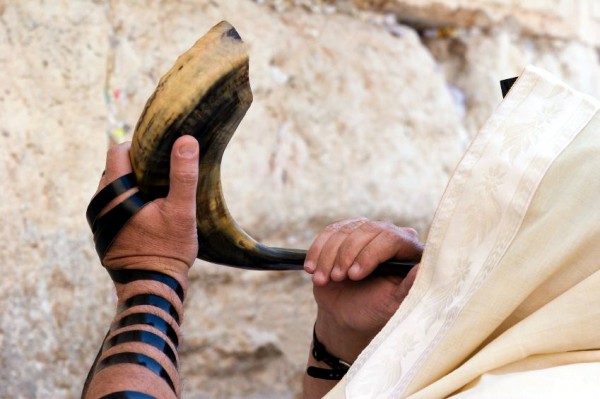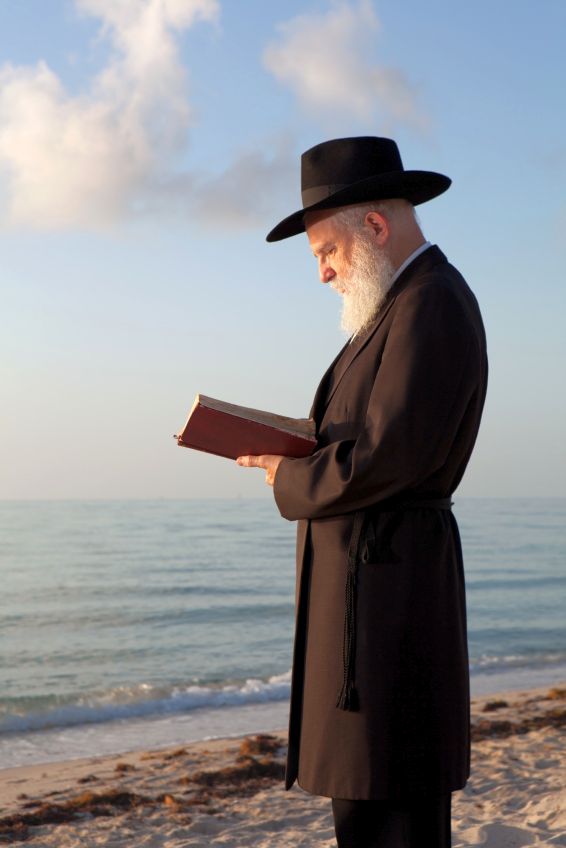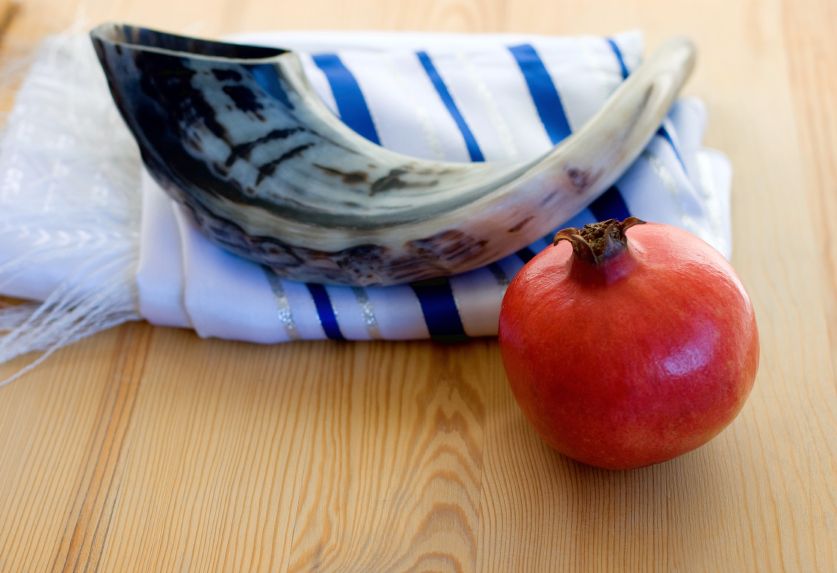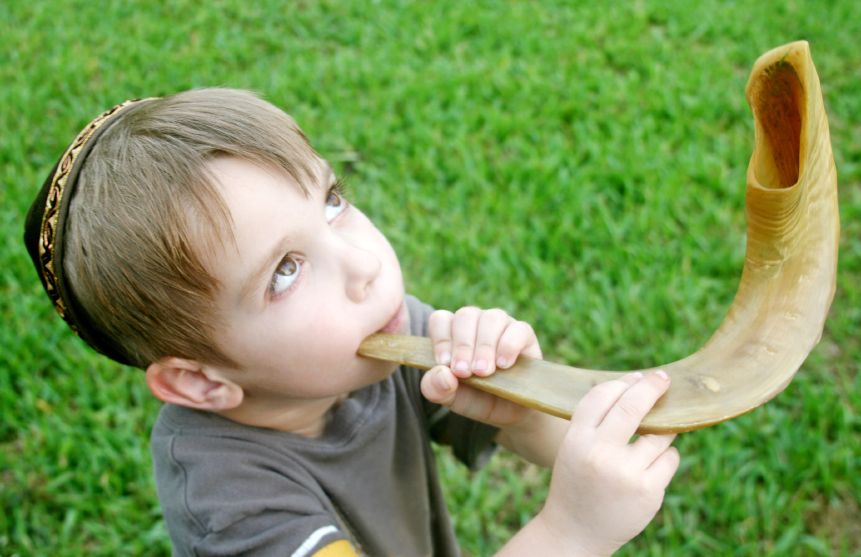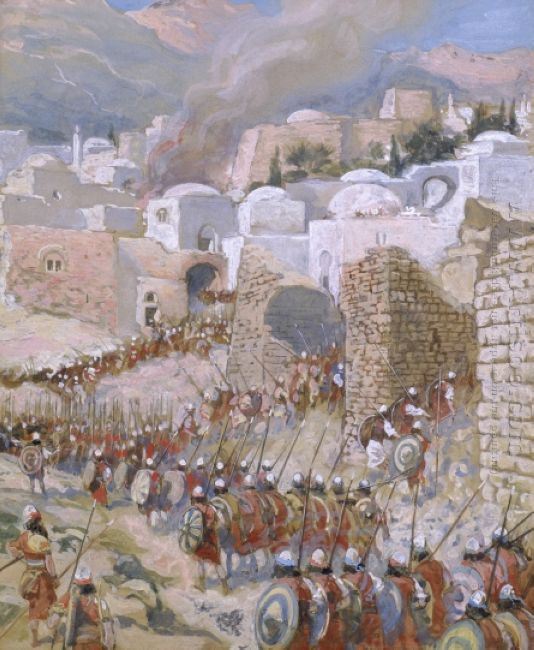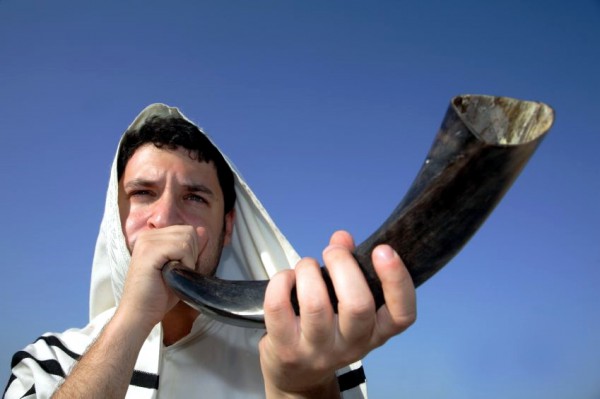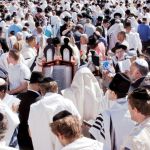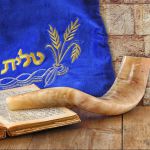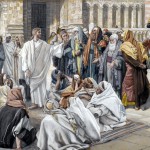“Say to the Israelites: ‘On the first day of the seventh month you are to have a day of sabbath rest, a sacred assembly commemorated with trumpet blasts. Do no regular work, but present a food offering to the Lord.’” (Leviticus 23:23–25)
Today is one of the holiest days of the Jewish year: Rosh HaShanah (Head of the Year)—the beginning of the Jewish year 5785.
Whatever day of the week this holy day falls upon, it is considered a Sabbath, no work is done. All over Israel and around the world, the Jewish People are attending services in local synagogues.
Biblically, this celebration is known as Yom Teruah (Feast of Trumpets).
Last night as the holiday began, selichot (prayers for forgiveness) intensified; and this morning, the shofar (ram’s horn or trumpet) is being sounded about 100 times, depending upon the community’s tradition.
It will continue to be sounded throughout this holiday season.
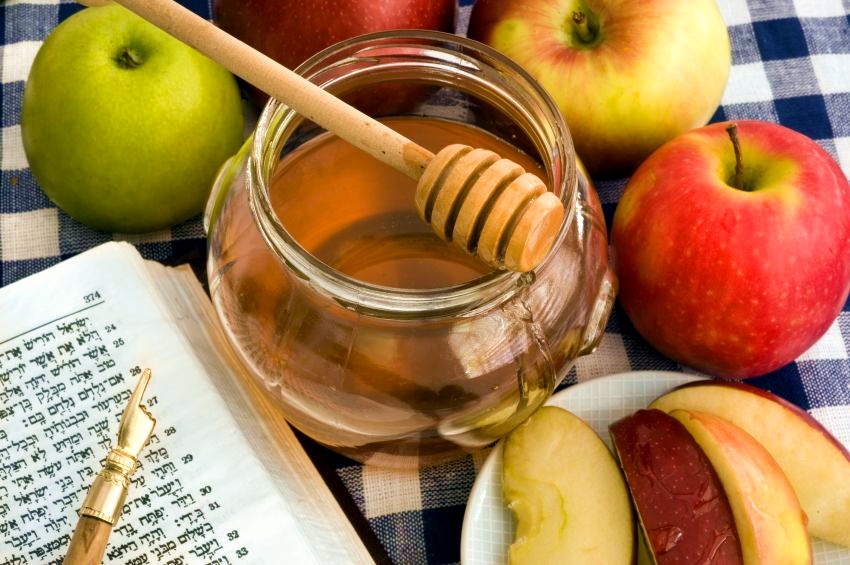
Honey and apple, foods traditionally served at Rosh HaShanah, symbolize the desire for a sweet new year.
First and Second Day Customs
This holiday is a feast; therefore, it is customary for families to gather for a holiday meal that begins with the blessing over two round challahs (egg bread) dipped in honey.
The challah is round to represent completeness, the continuity of creation and the omnipresence of God, as well as the yearly cycle.
Right afterward, apple slices are dipped in honey. This simple tradition conveys the hope that the coming year will be sweet and free of sorrow.
Today, a special ceremony called Tashlich (casting off) will be performed.
This ritual involves symbolically casting off sin. To do this, bits of bread and other food will be tossed into a body of water, such as a stream, river, lake, pond or sea, which will carry them away. As we toss them, we recite Micah 7:18–19 and other verses.
“Who is a God like you, who pardons sin and forgives the transgression of the remnant of his inheritance? You do not stay angry forever but delight to show mercy. You will again have compassion on us; You will tread our sins underfoot and hurl all our iniquities into the depths of the sea.” (Micah 7:18–19)
Tonight, as the sun goes down the second night of Rosh Hashanah will begin, and many will observe the tradition of serving a fruit that has just come into season.
This fruit is often the pomegranate since it comes into season in Israel around this time.
According to Jewish tradition, the pomegranate has 613 seeds, which is the same number of mitzvot (commandments) in the Torah.
The following blessing called the Shehecheyanu (Who Has Given Us Life) is recited before eating the fruit:
Blessed are You, Lord our God, King of the Universe, who has kept us alive, sustained us, and brought us to this season. Amen.
The Blasting of the Shofar
“On the first day of the seventh month you are to have a day of rest [Shabbaton], a sacred assembly [mikreh kodesh] commemorated with trumpet blasts [Zichron Teruah].” (Leviticus 23:24)
In Leviticus 23:24, Rosh HaShanah is called Shabbaton Zichron Teruah, which is translated as a special Sabbath holiday of remembrance with the blasting of the shofar.
That is why a central observance of this holy day is the sounding of the shofar, which heralds God as King of the Universe. The shofar played a role when He came to the Israelites in a dense cloud at Mount Sinai.
There in His presence, on the morning of the third day, three months after they left Egypt, amidst booming thunder and flashes of lightning, the shofar sounded.
We can only imagine the intensity of the scene. It was so powerful that “everyone in the camp trembled.” (Exodus 19:16)
Who blew the shofar from that thick cloud on Mount Sinai with all the people of Israel gathered below? Was it an angel of the Lord or did Elohim — God Himself — blow the shofar?
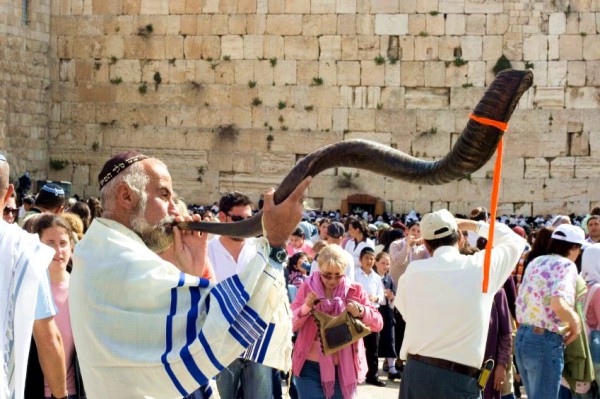
A Jewish man blows the long shofar, which is fashioned from the horn of a greater kudu (southeastern African antelope) in the Yemenite Jewish style, at the Western (Wailing) Wall.
The shofar is an instrument of great spiritual significance.
The purpose of the sound of the shofar is to wake God’s people out of their spiritual slumber, to cause them to see the signs of the times, and to remind them to examine the spiritual condition of their lives.
This is the message of teshuvah (repentance), which in Hebrew literally means to return. Teshuvah, therefore, is turning from our sins and returning to God.
So, why do we blow the shofar on Yom Zichron Teruah? Although we know it is a commandment, the reasons are not specifically stated.
“On the first day of the seventh month hold a sacred assembly and do no regular work. It is a day for you to sound the trumpets [Yom Teruah].” (Numbers 29:1)
Occasions to Blow the Shofar
In the Biblical time of Israel, the shofar was blown for several reasons:
- To mark the arrival of a new moon;
- To celebrate a simcha (joyous occasion);
- To proclaim liberty to the captives;
- To hail a king at his coronation;
- To warn of impending judgment;
- To gather troops to battle;
- To sound an alarm;
- To call a sacred assembly and time of fasting;
- To confuse the enemy camp; and
- To draw God’s attention.
Some of these purposes are found in the following prophecies of Joel:
Sounding the Shofar as an Alarm
“Blow the trumpet [shofar] in Zion, and sound an alarm in my holy mountain; let all the inhabitants of the land tremble: for the day of the Lord comes, for it is close at hand; a day of darkness and gloominess …
“Tear your heart, and not your garments, and turn to the Lord, your God; for He is gracious and merciful, slow to anger, and abundant in loving kindness, and relents from sending calamity.” (Joel 2:1–2, 13)
Sounding the Shofar to Call an Assembly
“Blow the trumpet [shofar] in Zion! Sanctify a fast. Call a solemn assembly.” (Joel 2:15)

Shofars are often made of ram’s horns.
The Shofar of Mercy: the Binding of Isaac
“Abraham said, ‘God will provide Himself the lamb for a burnt offering, my son.’” (Genesis 22:8)
Since the shofar is a ram’s horn, it may be understood to represent God’s mercy as demonstrated in the Book of Genesis when God spared the life of Isaac.
In obedience to God’s command, Abraham had prepared to offer up his son on the altar as a sacrifice; however, true to Abraham’s faith, God stayed His hand and provided a ram caught in the thicket for the sacrifice (Genesis 22).
Although some may blow the ram’s horn (shofar) to remind us of God’s mercy to Abraham, God has revealed His mercy to us even more so through Yeshua (Jesus).
He did not spare the life of His only Son, Yeshua, but gave it up for us in order that our names may be written in the Book of Life (Romans 8:32).
With this in mind, it is entirely fitting that we, along with the entire household of Israel, greet one another at this season with the traditional blessing: May your name be inscribed in the Book of Life!
“Nothing impure will ever enter it, nor will anyone who does what is shameful or deceitful, but only those whose names are written in the Lamb’s book of life.” (Revelation 21:27, see also Revelation 3:5; Exodus 32:32; Psalm 139:16)
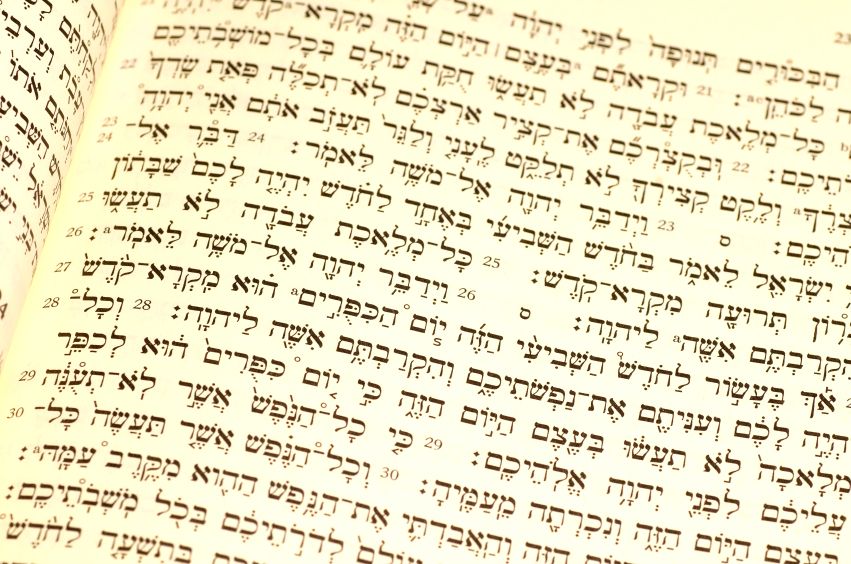
The Torah passage read at Rosh HaShanah, with the pertinent section, Leviticus 23:23-26, in sharpest focus.
The Shofar in Warfare
“So the people shouted, and the priests blew the trumpets [shofarot]. It happened, when the people heard the sound of the trumpet [shofar], that the people shouted with a great shout, and the wall fell down flat, so that the people went up into the city, every man straight before him, and they took the city.” (Joshua 6:20)
The Bible contains many references to the shofar being used in battle; for instance, in the Book of Joshua, we read that Joshua and his Israelite army took the enemy city of Jericho with the sounding of the shofarot (plural of shofar).
In another example found in the Book of Judges, Gideon and his small band of men blew their shofarot and gained a victory over the Midianites (Judges 7:19–25).
“When the three hundred trumpets sounded, the Lord caused the men throughout the camp to turn on each other with their swords.” (Judges 7:22)
How does this relate to us, as people of the God of Israel today?
God’s promise in the Book of Numbers to deliver His people when they blow the shofar in battle is still applicable:
“When you go to war in your land against the adversary who oppresses you, then you shall sound an alarm with the trumpets [shofarot]. Then you will be remembered before the Lord your God, and you will be saved from your enemies.” (Numbers 10:9)
Today, the shofar is being rediscovered as a powerful instrument of spiritual warfare.
For that reason, it is blown not only in Jewish synagogues during the High Holy Days, but also in Messianic Jewish Congregations and Christian Churches all over the world as a declaration of spiritual warfare.
The Shofar of Impending Judgment
In chapter eight of the Book of Revelation, judgment begins with the blast of the shofar — and the earth is struck with plagues reminiscent of those in Egypt:
“The first angel sounded his trumpet, and there came hail and fire mixed with blood, and it was hurled down upon the earth. A third of the earth was burned up, a third of the trees were burned up, and all the green grass was burned up.” (Revelation 8:7)
The blasts of the shofar will also herald the return of Yeshua (Jesus) and the resurrection of the dead: Yeshua the Messiah will return with a shout and the “shofar call of God.”
“For the Lord Himself will come down from heaven with a commanding shout, with the voice of an archangel, and with the shofar call of God, and the dead in Messiah will rise first.” (1 Thessalonians 4:16)
In First Corinthians, the resurrection of the dead in Messiah is also connected with the last shofar blast:
“Behold, I tell you a mystery. We will not all sleep, but we will all be changed, in a moment, in the twinkling of an eye, at the last trumpet [shofar]. For the trumpet will sound, and the dead will be raised incorruptible, and we will be changed.” (1 Corinthians 15:51–52)
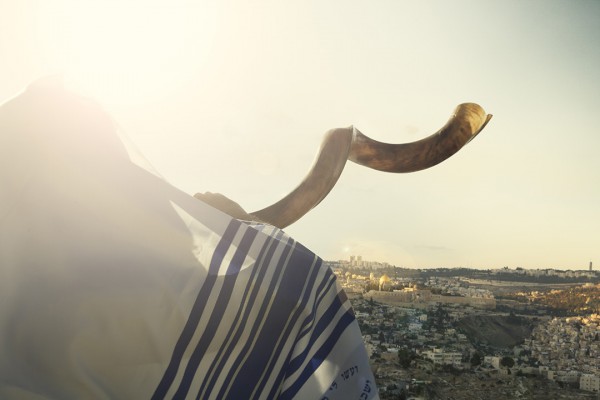
The seventh and final shofar that we read about in the Book of Revelation will sound when Yeshua returns to Jerusalem. It will hail Him as King Messiah.
The Shofar Hailing King Messiah
“The seventh angel sounded, and great voices in heaven followed, saying, ‘The kingdom of the world has become the Kingdom of our Lord, and of His Messiah. He will reign forever and ever!’” (Revelation 11:15)
The eleventh chapter of the Book of Revelation reveals that Yeshua (Jesus) will be hailed as King with the sounding of the seventh and final shofar.
As the time for the sounding of that seventh shofar draws ever nearer, we ask that you help us to sound the shofar of liberty to captive Israel and proclaim King Messiah Yeshua to the Jewish People.
“Blow the trumpet in Zion, and sound an alarm in my holy mountain! Let all the inhabitants of the land tremble, for the day of the Lord comes, for it is close at hand.” (Joel 2:1)




